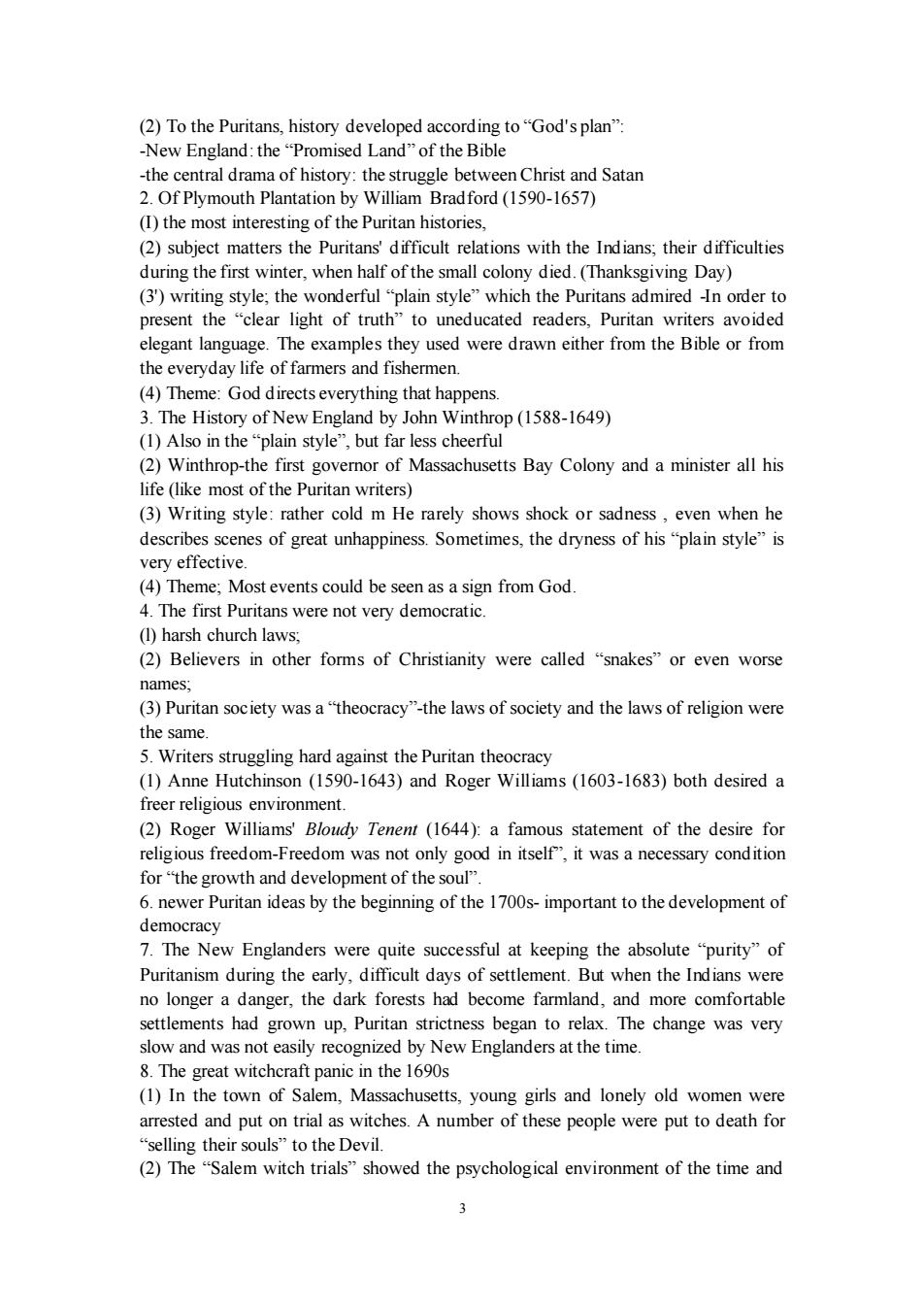正在加载图片...

(2)To the Puritans,history developed according toGod'splan" -New England:thePromised Land"of the Bible -the central drama of history:the struggle between Christ and Satan 2.Of Plymouth Plantation by William Bradford (1590-1657) (1)the most interesting of the Puritan histories. (2)subject matters the Puritans'difficult relations with the Indians;their difficulties 1 ring the first winter,when half of the sm died.(Thanksgiving Day) (3)writing style;the wonderful present the "clear light of truth to uneducated readers,Puritan writers avoided elegant language.The examples they used were drawn either from the Bible or from the everyday life of farmers and fishermen. (4)The e:God directsev ng that ha The History of N Winthrop(1588-1649) (1)Also in the "plain style,but far less cheerful (2)Winthrop-the first governor of Massachusetts Bay Colony and a minister all his life (like most of the Puritan writers) (3)Writing style:rather cold m He rarely shows shock or sadness,even when he describes scenes of great unhappiness.Sometimes,the dryness of hisplain very effective (4)Theme:Most events could be seen as a sign from God 4.The first Puritans were not very democratic. (1)harsh church laws: (2)Believers in other forms of Christianity were called "snakes"or even worse names (3)Puritan society was a"theocracy-the laws of society and the laws of religion were the same. 5.Writers struggling hard against the Puritan theocracy (1)Anne Hutchir n(1590-1643)and Roger Williams(1603-1683)both desired a environment (2)Roger Williams'Bloudy Tenent (1644):a famous statement of the desire for religious freedom-Freedom was not only good in itself",it was a necessary condition for"the growth and development of the soul". 6.newer Puritan ideas by the beginning of the 1700s-important to the development of 7.The New Englanders were quite successful at keeping the absolute"purity"of Puritanism during the early,difficult days of settlement.But when the Indians were no longer a danger,the dark forests had become farmland,and more comfortable settlements had grown up,Puritan strictness began to relax.The change was very slow and was no asily ized by New Englanders at the time .The great witche raft panic in the 1690s (1)In the town of Salem,Massachusetts,young girls and lonely old women were arrested and put on trial as witches.A number of these people were put to death for “selling their souls'”to the Devil. (2)The"Salem witch trials"showed the psychological environment of the time and3 (2) To the Puritans, history developed according to “God's plan”: -New England: the “Promised Land” of the Bible -the central drama of history: the struggle between Christ and Satan 2. Of Plymouth Plantation by William Bradford (1590-1657) (I) the most interesting of the Puritan histories, (2) subject matters the Puritans' difficult relations with the Indians; their difficulties during the first winter, when half of the small colony died. (Thanksgiving Day) (3') writing style; the wonderful “plain style” which the Puritans admired -In order to present the “clear light of truth” to uneducated readers, Puritan writers avoided elegant language. The examples they used were drawn either from the Bible or from the everyday life of farmers and fishermen. (4) Theme: God directs everything that happens. 3. The History of New England by John Winthrop (1588-1649) (1) Also in the “plain style”, but far less cheerful (2) Winthrop-the first governor of Massachusetts Bay Colony and a minister all his life (like most of the Puritan writers) (3) Writing style: rather cold m He rarely shows shock or sadness , even when he describes scenes of great unhappiness. Sometimes, the dryness of his “plain style” is very effective. (4) Theme; Most events could be seen as a sign from God. 4. The first Puritans were not very democratic. (l) harsh church laws; (2) Believers in other forms of Christianity were called “snakes” or even worse names; (3) Puritan society was a “theocracy”-the laws of society and the laws of religion were the same. 5. Writers struggling hard against the Puritan theocracy (1) Anne Hutchinson (1590-1643) and Roger Williams (1603-1683) both desired a freer religious environment. (2) Roger Williams' Bloudy Tenent (1644): a famous statement of the desire for religious freedom-Freedom was not only good in itself”, it was a necessary condition for “the growth and development of the soul”. 6. newer Puritan ideas by the beginning of the 1700s- important to the development of democracy 7. The New Englanders were quite successful at keeping the absolute “purity” of Puritanism during the early, difficult days of settlement. But when the Indians were no longer a danger, the dark forests had become farmland, and more comfortable settlements had grown up, Puritan strictness began to relax. The change was very slow and was not easily recognized by New Englanders at the time. 8. The great witchcraft panic in the 1690s (1) In the town of Salem, Massachusetts, young girls and lonely old women were arrested and put on trial as witches. A number of these people were put to death for “selling their souls” to the Devil. (2) The “Salem witch trials” showed the psychological environment of the time and